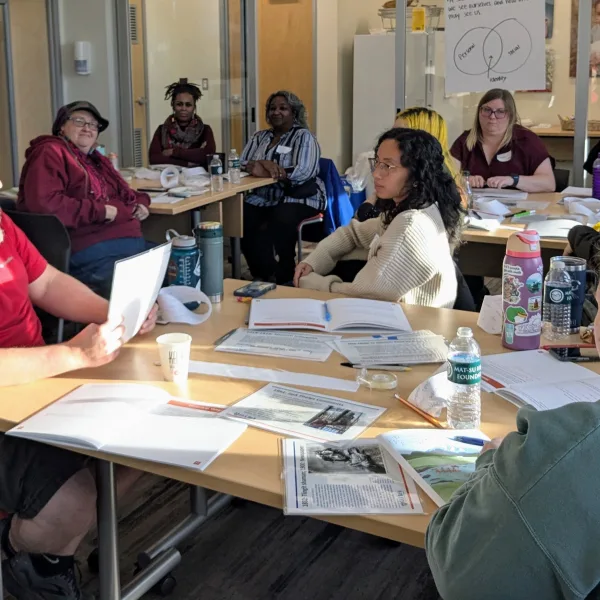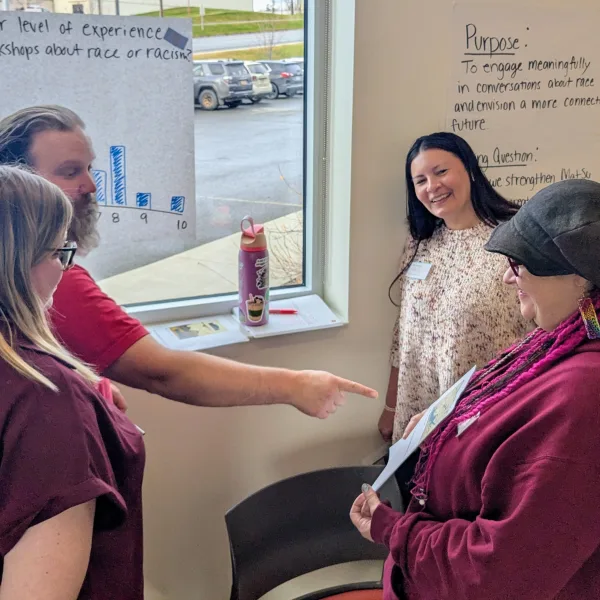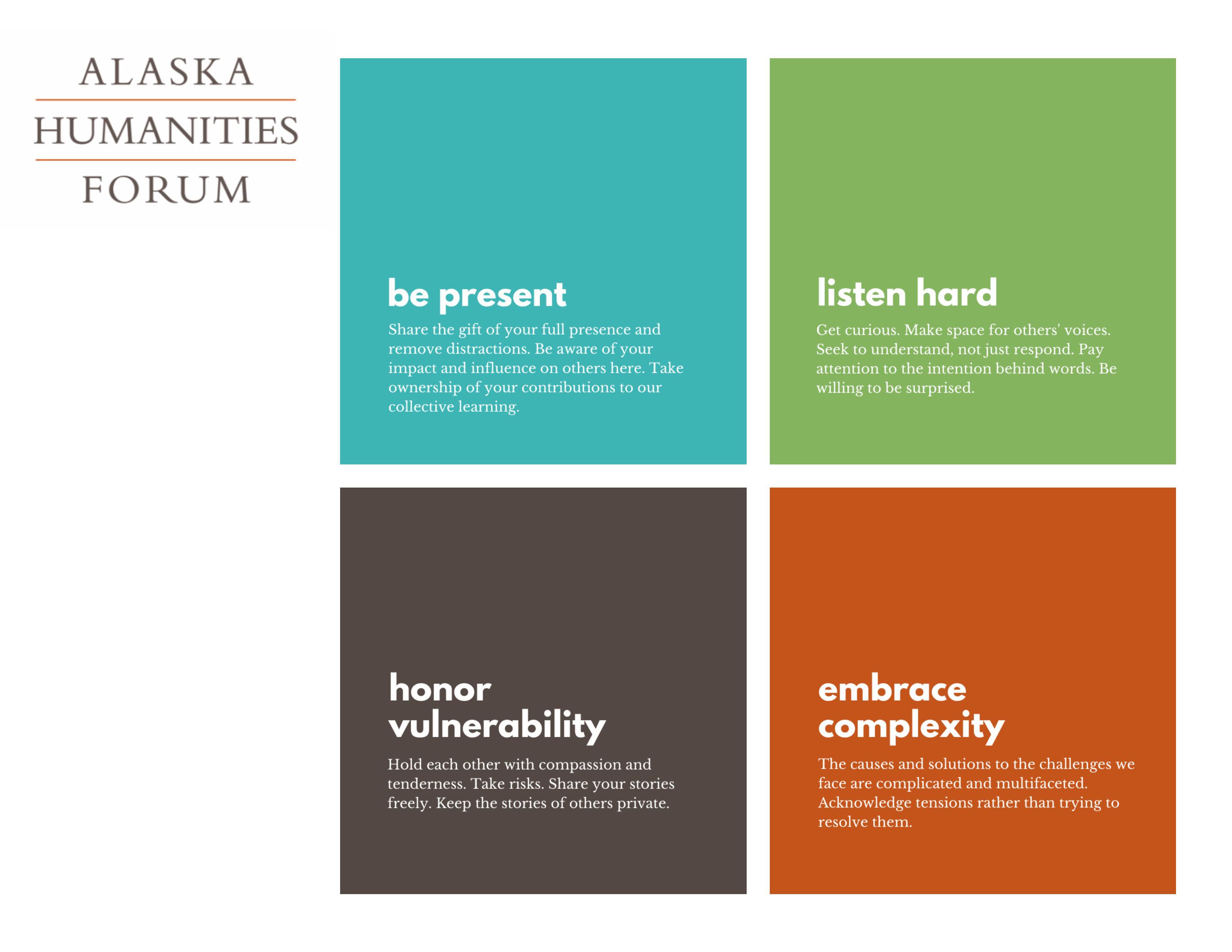
Photo from Braided Stories workshop, Oct 2025

Photo from Braided Stories workshop, Oct 2025
Taylor Strelevitz • November 6, 2025
When I first started at the Alaska Humanities Forum five years ago, it was fall 2020. George Floyd had been murdered just four months earlier, and our country, state, and city were still reeling. Our community was at a crossroads on what to do next. Do we invest in training our police? Do we start over entirely? George Floyd didn't owe us the opportunity to reflect but we took it. And our public grieving surfaced deep pain between neighbors, colleagues, over kitchen tables, and across social media.
The Forum's response, unsurprisingly, was to talk about it. We launched Conversations Across Generations, a program that ran for two years and brought nearly a hundred participants together to wrestle with a difficult question: what does racial equity demand of us? While we may talk about race across generations within our own families (who often share our racial identities), other opportunities to have deep, multi-generational discussions across race are limited. This program was meant to offer that opportunity.
You can imagine that these conversations were messy. I made so many mistakes, too many to count. How do you create a space where white participants can process guilt without hurting participants of Color who are grieving? An impossible question.


Everything I’ve ever learned about race has come from listening to someone of Color share their story. No book, podcast, or article could have had the same impact. Change happens in relationship, not just through sharing information. I wanted to create spaces where that kind of sharing could happen but quickly realized our team was unprepared for the unpredictability of human emotion. Sometimes, a single comment could feel like a bomb going off in the room, destroying trust built over hours. Other times, it was like a small fire slowly growing in the corner, the smoke quietly suffocating.
We dove headfirst into training. I studied with the Sustained Dialogues Institute and Essential Partners, organizations tackling some of the most challenging divides in communities worldwide. Drawing on these lessons, we developed an internal Forum workshop: Facilitating Through Conflict. Using real-life scenarios from our Conversations Across Generations program, we practiced responses again and again:
“I don’t understand why we are only talking about race. Homophobia is just as important, and drag queens are under attack. Why aren’t we talking about that?”
“As a Brown person, I can say we need to pick ourselves up and move on. We aren’t helping ourselves by blaming White people.”
These statements used to make me sweat uncontrollably. Now, we have a structured process that helps navigate them:
1. Acknowledge why the conversation has paused or shifted.
2. Identify which group agreement was impacted.
3. Propose a path forward.

AKHF Group Agreements
Often, the hardest step is simply acknowledging the tension. But what’s powerful is that (as a facilitator) I don’t need to have all the answers…the group often does. My role is to create the conditions for those answers to emerge and be heard.
For nearly eight years, the Forum has hosted Leading Conversations That Build Community, teaching people how to design gatherings that connect people to each other and build the trust that can help prevent conflict. But even with the best preparation, humans are unpredictable. Emotions run high, discussions fall apart, and the most common question I hear in that workshop is: “What do I do if people start fighting?” That question tells you a lot about the state of communication in our country. Facilitating Through Conflict is our answer - a practical, repeatable approach to navigating conflict when it inevitably arises.
I got to test this process out first hand recently. Ironically I was leading the workshop Facilitating Through Conflict. I had just introduced myself with they/them pronouns. Someone across the room from me opened with the belief that there are only two genders and that to suggest anything different was disrespectful to women. The silence was palpable, so heavy it felt hard to breathe. People shifted uncomfortably in their chairs, avoiding eye contact.
I paused us and said "I could feel things change in the room when that was shared. Let’s remember our agreement to honor vulnerability." I looked around the room and asked if anyone had anything they wanted to share in response. To my relief, the group took it from there. There was a healthy back and forth discussion about what it means to respect one another. Some participants expressed hurt, while others showed curiosity. Soon we moved on to the workshop content. It didn't change that the comment hurt, and it didn't mean we all suddenly agreed but everyone, myself included, felt heard.
Conflict doesn’t have to derail a conversation. With the right tools and a clear process, it can deepen understanding, build trust, and create meaningful learning opportunities. Facilitating Through Conflict equips participants with the skills to navigate these moments with confidence.
The Alaska Humanities Forum is a non-profit, non-partisan organization that designs and facilitates experiences to bridge distance and difference – programming that shares and preserves the stories of people and places across our vast state, and explores what it means to be Alaskan.
February 16, 2026 • Colleen Lomenick
January 28, 2026 • Polly Carr
January 20, 2026 • Shoshi Bieler